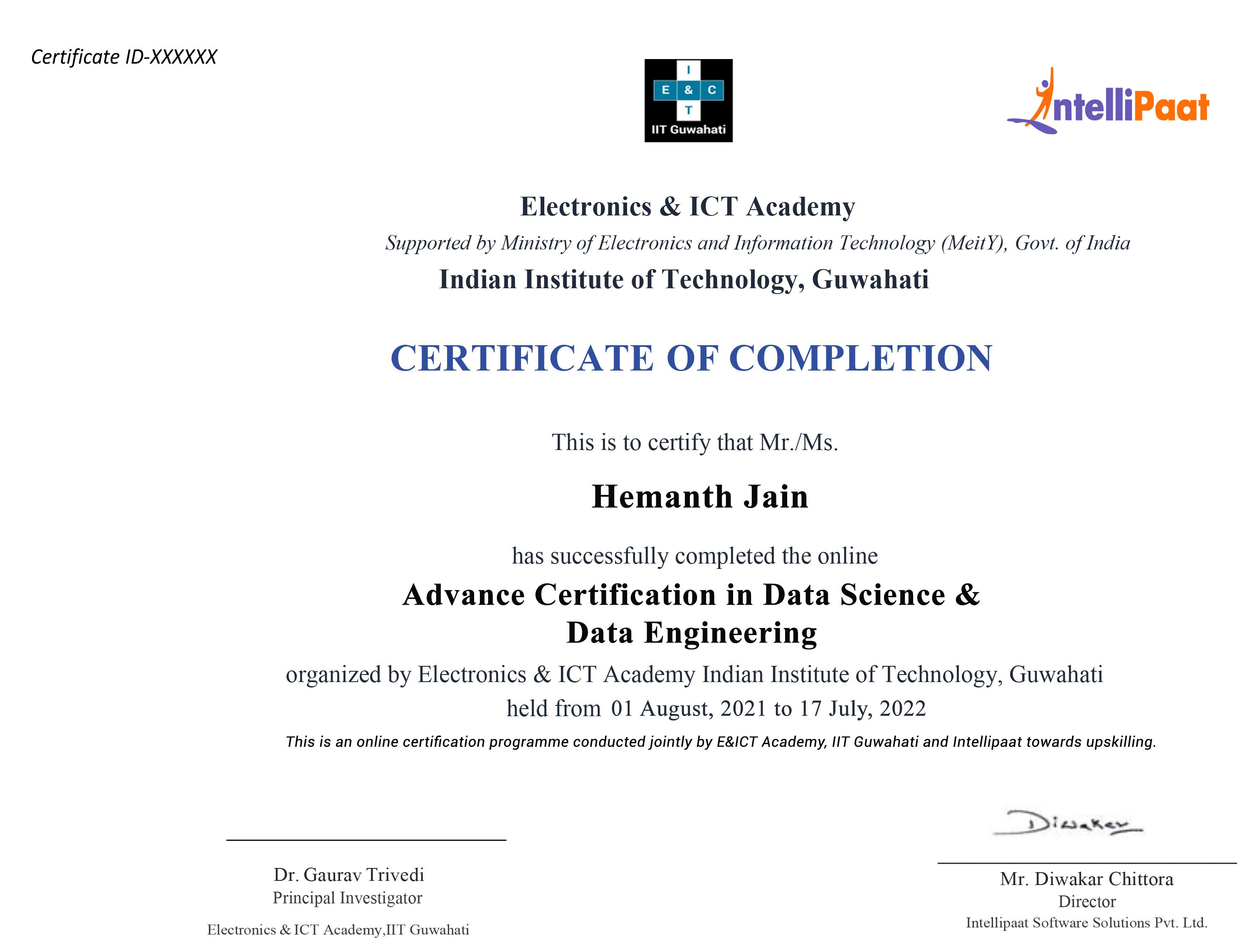Your cart is currently empty.






This advanced certification in data science and data engineering by E&ICT, IIT Guwahati and Intellipaat is designed by domain experts and is in line with industry requirements to help you master the required skills like python, linux, SQL, machine learning, spark, and power BI, etc. through real-time case studies. Learn from industry experts and become a certified data science and data engineering professional.
Learning Format
Online Bootcamp
Live Classes + Projects
9 Months
Career Services
by Intellipaat
E&ICT IIT Guwahati
Certification
EMI Starts
at ₹5500/month*
Read More
Partnering with E&ICT, IIT Guwahati
This certification program in data science and data engineering is in partnership with E&ICT Academy IIT Guwahati. E&ICT IIT Guwahati is an initiative of the Ministry of Electronics and Information Technology (MeitY), Govt. of India in collaboration with the team of IIT Guwahati professors to provide high-quality education programs.
Upon completion of this program, you will:
55% Average Salary Hike
45 LPA Highest Salary
12000+ Career Transitions
400+ Hiring Partners
Career Transition Handbook
*Past record is no guarantee of future job prospects
Understands the issues and creates models based on the data gathered, and also manages a team of data scientists.
Builds strategies on frameworks and technologies to develop AI solutions and helps the organization prosper.
With the help of several machine learning tools and technologies, builds statistical models with huge chunks of business data.
Designs and builds machine learning models to derive intelligence for the numerous services and products offered by the organization.
Creates and manages pluggable service-based frameworks that are customized in order to import, cleanse, transform, and validate data.
Extracts data from the respective sources to perform business analysis, and generates reports, dashboards, and metrics to monitor the company’s performance.
Creates overall technical vision for a solution to a specific business problem, while designing, describing, and managing the solution.
Skills to Master
Python
Data Science
Data Analysis
Data Pipelines
Data Processing
SQL
NumPy
Pandas
SciPy
AI
Git
MLOps
Data Wrangling
Storytelling
Machine Learning
Prediction Algorithms
NLP
PySpark
Model
Data Visualization
Azure Data Engineering
1. Non-Relational Data Stores and Azure Data Lake Storage
1.1 Document data stores
1.2 Columnar data stores
1.3 Key/value data stores
1.4 Graph data stores
1.5 Time series data stores
1.6 Object data stores
1.7 External index
1.8 Why NoSQL or Non-Relational DB?
1.9 When to Choose NoSQL or Non-Relational DB?
1.10 Azure Data Lake Storage
Definition, Azure Data Lake-Key Components, How it stores data? Azure Data Lake Storage Gen2, Why Data Lake? Data Lake Architecture
2. Data Lake and Azure Cosmos DB
2.1 Data Lake Key Concepts
2.2 Azure Cosmos DB
2.3 Why Azure Cosmos DB?
2.4 Azure Blob Storage
2.5 Why Azure Blob Storage?
2.6 Data Partitioning: Horizontal partitioning, vertical partitioning, Functional partitioning
2.7 Why Partitioning Data?
2.8 Consistency Levels in AzureCosmos DB: Semantics of the five-consistency level
3. Relational Data Stores
3.1 Introduction to Relational Data Stores
3.2 Azure SQL Database – Deployment Models, Service Tiers
3.3 Why SQL Database Elastic Pool?
4. Why Azure SQL?
4.1 Azure SQL Security Capabilities
4.2 High-Availability and Azure SQL Database: Standard Availability Model, Premium Availability Model
4.3 Azure Database for MySQL
4.4 Azure Database for PostgreSQL
4.5 Azure Database for MariaDB
4.6 What is PolyBase and Why PolyBase?
4.7 What is Azure Synapse Analytics (formerly SQL DW): SQL Analytics and SQL pool in Azure Synapse, Key component of a big data solution, SQL Analytics MPP architecture components
5. Azure Batch
5.1 What is Azure Batch?
5.2 Intrinsically Parallel Workloads
5.3 Tightly Coupled Workloads
5.4 Additional Batch Capabilities
5.5 Working of Azure Batch
6. Azure Data Factory
6.1 Flow Process of Data Factory
6.2 Why Azure Data Factory
6.3 Integration Runtime in Azure Data Factory
6.4 Mapping Data Flows
7. Azure Data Bricks
7.1 What is Azure Databricks?
7.2 Azure Spark-based Analytics Platform
7.3 Apache Spark in Azure Databricks
8. Azure Stream Analytics
8.1 Working of Stream Analytics
8.2 Key capabilities and benefits
8.3 Stream Analytics Windowing Functions: Tumbling window, Hopping Window, Sliding Window, Session Window
Data Science Capstone Projects
Business Case Studies
Projects will be a part of your Certification in Data Science & Data Engineering to consolidate your learning. It will ensure that you have real-world experience in Data Science and Data Engineering.

Admission Details
The application process consists of three simple steps. An offer of admission will be made to selected candidates based on the feedback from the interview panel. The selected candidates will be notified over email and phone, and they can block their seats through the payment of the admission fee.
Submit Application
Tell us a bit about yourself and why you want to join this program
Application Review
An admission panel will shortlist candidates based on their application
Admission
Selected candidates will be notified within 1–2 weeks
This is one of the best data science and data engineering certification courses as it is designed keeping the industry requirement in mind to provide you with the required expertise to handle various aspects of data science and data engineering roles and responsibilities. The career prospects that you will achieve after the completion of the course are innumerable and have highly lucrative opportunities.
The advanced certification in data science and data engineering is offered by E&ICT, IIT Guwahati and Intellipaat. These instructors aim to make you proficient in the field of data science and engineering and have designed a curated curriculum in the form of online video lectures and projects to help you gain in-depth knowledge of data science and data engineering concepts..
If you fail to attend any of the live lectures, you will get a copy of the recorded session in the next 12 hours. Moreover, if you have any other queries, you can get in touch with our course advisors or post the questions on our community page.
On the successful completion of the training program and the fulfillment of all the requirements, including successfully passing the certification exam by Intellipaat, you will be awarded an advanced certification in data science and data engineering by E&ICT, IIT Guwahati.
Intellipaat is known for its quality training and industry mentorship. Our alumni are placed in reputed organizations globally such as Amazon, Microsoft, Genpact, Sony, Gartner, etc. Our learners also get lifetime access to free upgrades and learning material, which will help them at any point of time in their careers.
By enrolling with Intellipaat’s data science and engineering courses online, you will be able to take advantage of exclusive career guidance benefits, interview preparation, etc.
On average the starting salary of a data scientist is 10 LPA and that of a data engineer is 9 LPA. You can also check our dedicated blog on data science salaries in India based on various job roles.
Learners need to devote at least 8–10 hours per week for effective learning. Our live classes are flexible, and hence, working professionals can easily manage their learning and job together.
The duration of this program is nine months, which includes eight months of live sessions, and multiple project hours, and real-life assignments for a month.
Please note that the course fees is non-refundable and we will be at every step with you for your upskilling and professional growth needs.
Due to any reason you want to defer the batch or restart the classes in a new batch then you need to send the batch defer request on [email protected] and only 1 time batch defer request is allowed without any additional cost.
Learner can request for batch deferral to any of the cohorts starting in the next 3-6 months from the start date of the initial batch in which the student was originally enrolled for. Batch deferral requests are accepted only once but you should not have completed more than 20% of the program. If you want to defer the batch 2nd time then you need to pay batch defer fees which is equal to 10% of the total course fees paid for the program + Taxes.
Yes, Intellipaat certification is highly recognized in the industry. Our alumni work in more than 10,000 corporations and startups, which is a testament that our programs are industry-aligned and well-recognized. Additionally, the Intellipaat program is in partnership with the National Skill Development Corporation (NSDC), which further validates its credibility. Learners will get an NSDC certificate along with Intellipaat certificate for the programs they enroll in.
What is included in this course?
 Click to Zoom
Click to Zoom




